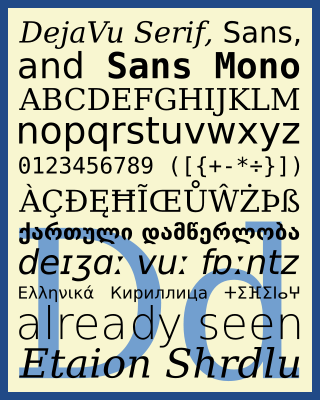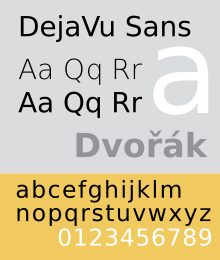- DejaVu fonts
-
"DejaVu" redirects here. For the feeling that one has witnessed something previously, see déjà vu. For other uses, see Déjà vu (disambiguation).
DejaVu Category Serif,
Sans (sans-serif),
Sans Mono (monospace)
variants: Bold, Oblique, Bold ObliqueFoundry None Date created 2004 Date released 2011-02-27 v.2.33 License Free license Design based on Bitstream Vera release 1.10 Variations Serif Condensed (*),
Sans Condensed (*),
(*): experimental style
Sample The DejaVu fonts are modifications of the Bitstream Vera fonts designed for greater coverage of Unicode, as well as providing more styles. The Bitstream Vera family was limited mainly to the characters in the Basic Latin and Latin-1 Supplement portions of Unicode (roughly equivalent to ISO-8859-15) but was released with a license that permitted changes. The DejaVu fonts project was started with the aim to "provide a wider range of characters... while maintaining the original look and feel through the process of collaborative development". The development of the fonts is done by many contributors, and is organized through a wiki and a mailing list.
The DejaVu fonts project was started by Štěpán Roh. Over time, it has absorbed several other projects that also existed to extend the Bitstream Vera typefaces; these projects include the Olwen Font Family, Bepa, Arev Fonts (only partially), and the SuSE standard fonts. The fonts are free software, and may thus freely be embedded. DejaVu fonts can be obtained from the DejaVu project on SourceForge. Some GNU/Linux distributions (such as Ubuntu, OpenSUSE and Mandriva Linux) include DejaVu fonts in their default installation.[1][2][3] The open source software OpenOffice.org includes DejaVu fonts in its installation packages.[4][5][6] These fonts are also included in proprietary BlackBerry OS (under the name BBAlphaSans and BBAlphaSerif).[7]
Contents
Role of typographically-incompatible scripts
Recently there has been some question within the DejaVu community about the role of scripts typographically incompatible with the typographically-similar scripts Latin, Greek, and Cyrillic (LGC). Most notably, Arabic has been added, but it has caused some software compatibility issues. Further, Latin and Arabic scripts have fundamentally different approaches to typefaces: while Latin fonts have serif and sans-serif versions, Arabic fonts have different distinctions (see Islamic calligraphy). It is still uncertain how the project should handle the mixture between different Latin faces and the different Arabic faces.
The uncertain status of Arabic and other alphabets has led to the creation of DejaVu LGC, a subset of the DejaVu fonts which contains only Latin, Greek, and Cyrillic characters. This version also tends not to experience as many software issues.[citation needed]
Coverage
DejaVu is an active project, which aims for complete coverage of the alphabetic scripts, abjads, and symbols with all characters that are part of the MES-1, MES-2, and hopefully MES-3 subsets of Unicode. The coverage is already considerable, although some more work is needed to include more hinting rules for clear results at small sizes. Some kerning rules are still being developed for the Sans and Serif styles, for fine typography. Some work is still also needed to create ligatures in these styles.
As of version 2.32, it included characters from the following Unicode blocks.[8] (The fraction given is the number of characters in each block that are included in the DejaVu fonts.)
Plane 0: Basic Multilingual Plane (BMP) Range: 0000-FFFF (0-65,535)
C0 Controls and Basic Latin (95/95) 100% C1 Controls and Latin-1 Supplement (96/96) 100% Latin Extended-A (128/128) 100% Latin Extended-B (208/208) 100% IPA Extensions (96/96) 100% Spacing Modifier Letters (63/80) 79% Combining Diacritical Marks (93/112) 83% Greek and Coptic (134/134) 100% Cyrillic (256/256) 100% Cyrillic Supplement (36/38) 94% Armenian (86/86) 100% Hebrew (54/87) 62% Arabic (161/250) 64% N'Ko (54/59) 92% Thai (1/87) 1% Lao (65/65) 100% Georgian (83/83) 100% Unified Canadian Aboriginal Syllabics (404/640) 63% Ogham (29/29) 100% Phonetic Extensions (106/128) 82% Phonetic Extensions Supplement (38/64) 59% Combining Diacritical Marks Supplement (6/42) 14% Latin Extended Additional (252/256) 98% Greek Extended (233/233) 100% General Punctuation (107/107) 100% Superscripts and Subscripts (34/34) 100% Currency Symbols (23/25) 92% Combining Diacritical Marks for Symbols (7/33) 21% Letterlike Symbols (75/80) 94% Number Forms (55/58) 94% Arrows (112/112) 100% Mathematical Operators (256/256) 100% Miscellaneous Technical (117/232) 50% Control Pictures (2/39) 5% Enclosed Alphanumerics (10/160) 6% Box Drawing (128/128) 100% Block Elements (32/32) 100% Geometric Shapes (96/96) 100% Miscellaneous Symbols (186/250) 74% Dingbats (174/175) 99% Miscellaneous Mathematical Symbols-A (9/44) 20% Supplemental Arrows-A (16/16) 100% Braille Patterns (256/256) 100% Supplemental Arrows-B (128/128) 100% Miscellaneous Mathematical Symbols-B (13/128) 10% Supplemental Mathematical Operators (72/256) 28% Miscellaneous Symbols and Arrows (35/87) 40% Latin Extended-C (31/32) 96% Tifinagh (55/55) 100% Supplemental Punctuation (6/50) 12% Yijing Hexagram Symbols (64/64) 100% Cyrillic Extended-B (31/78) 40% Modifier Tone Letters (20/32) 62% Latin Extended-D (57/114) 50% Alphabetic Presentation Forms (58/58) 100% Arabic Presentation Forms-A (98/595) 16% Variation Selectors (16/16) 100% Combining Half Marks (4/7) 57% Arabic Presentation Forms-B (141/141) 100% Specials (5/5) 100% Plane 1: Supplementary Multilingual Plane (SMP) Range: 10000-1FFFF (65,536-131,071)
Tai Xuan Jing Symbols (87/87) 100% Mathematical Alphanumeric Symbols (117/996) 12% Domino Tiles (100/100) 100% Styles
The 10 styles provided by the original Bitstream Vera fonts have been augmented to 21 styles:
DejaVu Sans DejaVu Serif DejaVu Sans Mono Book / Oblique Book / Italic Book / Oblique Bold / Oblique Bold / Italic Bold / Oblique Extralight Condensed / Oblique Condensed / Italic Condensed Bold / Oblique Condensed Bold / Italic Original styles are marked in bold.
See also
References
- ^ "DejaVu - Download". http://dejavu-fonts.org/wiki/index.php?title=Download. Retrieved 2010-02-05.
- ^ "Package List/11.2/KDE4-LiveCD-i686". http://en.opensuse.org/Package_List/11.2/KDE4-LiveCD-i686. Retrieved 2010-02-05.[dead link]
- ^ Packages included in Mandriva Linux One 2010, http://wiki.mandriva.com/en/Mandriva_Linux_2010#Package_Lists, retrieved 2010-02-05
- ^ "New Features in OpenOffice.org 2.4". 2008-03. http://development.openoffice.org/releases/2.4.0.html. Retrieved 2010-01-15.
- ^ "OpenOffice.org Wiki - External/Modules". http://wiki.services.openoffice.org/wiki/External/Modules#Fonts. Retrieved 2010-01-31.
- ^ "Debian - Package: openoffice.org". http://packages.debian.org/en/sid/openoffice.org. Retrieved 2010-01-31.
- ^ "Like Those Pretty Fonts in OS 4.5+? Thank Bitstream (Bolt) & DejaVu". 2009-08-07. http://www.berryreview.com/2009/08/07/like-those-pretty-fonts-in-os-4-5-thank-bitstream-bolt-dejavu/.
- ^ "DejaVu unicode coverage file". http://dejavu-fonts.org/wiki/index.php?title=Current_status. Retrieved 2010-08-23.
External links
- DejaVuWiki (official website)
- http://sourceforge.net/projects/dejavu/ (Sourceforge project website)
- CNet article on DejaVu fonts, July 11, 2006
Free and Open Source Typography Operating system typefaces - GNU FreeFont
- Ghostscript fonts
- GNU Unifont
- Cantarell
- Droid
- Liberation
- Ubuntu
Other typefaces - Allerta
- Asana-Math
- Beteckna
- Bitstream Vera
- Caslon Roman
- Chandas
- Charis SIL
- Computer Modern
- DejaVu
- Doulos SIL
- Fixedsys Excelsior
- Gentium
- HyperFont
- Inconsolata
- Junicode
- Kochi
- Latin Modern
- Linux Libertine
- M+
- Nimbus Mono
- Nimbus Roman
- Nimbus Sans
- OCR-A
- OCR-B
- PT Sans
- Taigi Unicode
- Tiresias
- Ubuntu-Title
- WenQuanYi
- XITS
Software Licenses - SIL Open Font License
- Ubuntu Font Licence
Groups and People Open-source Unicode Typefaces - List of open source typefaces
- List of free software Unicode typefaces
Categories:- 2004 introductions
- Unified serif and sans-serif typeface families
- Free software Unicode typefaces
Wikimedia Foundation. 2010.



